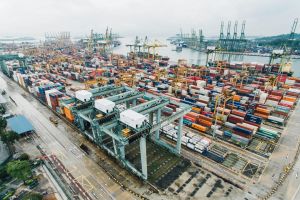Cybersecurity and International Trade: Avoiding Digital Trade Risks

Ever since the global pandemic exposed the flaws of paper-based traditional international trade finance processes, most organizations have made efforts to shift their business processes to digital platforms. Trade parties like importers, exporters, or supply chain finance providers, no matter SMEs or established ones, started to insert, share or store trade documents or confidential data/information online on more secure & safe channels.
Take the example of blockchain technology in trade finance that uses a decentralized network to enable participants to initiate transactions even in the absence of a trusted, legal central authority. It eliminates fraudulent activities as no participant can edit, change or alter shared data without the consent of other participants. MLETR (Model Law on Electronic Transferable Records) is another example.
Undoubtedly, digitization is the future of trade but every new technology has its drawbacks also. While various countries are on their way to transforming traditional trade processes into digital, trade is being exposed and becoming more vulnerable to cyber-attacks & threats. It is experiencing disruptions in the forms of denial of access, breach of confidentiality, sensitive information theft, manipulation, and broken trust between parties.
Companies need to incorporate the basic or advanced levels of cybersecurity measures to protect themselves & customers from any upcoming fraud. The trade finance industry is considering DLT adoption amid COVID-19. But with so much dependency of international trade on digital systems, where every trade information is kept on a computer, it is not as easy as it seems. Navigating & reducing these risks requires a mass-level adoption of cybersecurity steps by every transnational company.
Here are the major cybersecurity threats -
1. Form-Jacking - JavaScript is used to steal data such as payment information2. Supply Chain Hacking -Invasion of third-party services
3. Ransomware - Encrypting data and asking for money to provide access
Governmental Endeavors Over Cybersecurity In International Trade
Many countries have incorporated high-quality cybersecurity policies and regulations, especially around payments that take place in international trade. Many of these policies require global corporations and supporting standardized policies, to ensure frequent transactions. This cooperation will be required to develop efficient systems to protect against the dangerous impacts of cyberthreats.Trade Policies To Cope Cybersecurity
1. Information access and sharing
Artificial intelligence (AI) and data analytics are the two most critical instruments for companies to detect & fight against cyberattacks in the trade industry. These fintechs are proving to be a boon for small exporters. But these preventive measures will only get effective when they can have access to a large pool of information where all the sensitive data is kept in different location paths, formats, and languages with different access levels.2. Standards and compliance certifications for cybersecurity
Many organizations such as ISO and ICC are introducing several standards with guidelines as “frameworks for managing risks,” so that they could be widely incorporated across the world. Trade policies following these standards can help ensure solid protections with timely access to the authority in case of any disputes.3. Risk-Based Approach
The Organization for Economic Co-operation and Development (OECD) is initiating the adoption of a risk-based approach to cope with cybersecurity with its associating members. It is also considering international trade policy for the same as it will help form a system where risks can be minimized to a bearing level without affecting the flow of trade.Steps To Improve Cybersecurity
Here is what organizations indulged in international trade are required to improve their firm’s cybersecurity:1. Review Insurance Policy
Digital assets get covered in every business’s policies but when any revolutionary techniques or complications arise in the company, not every insurance policy is capable enough to handle these additional aspects. So, companies should review their policy to ensure that it protects them from upcoming overseas dangers, covers informational breaches and cyberthreats or any other physical damage, etc.






